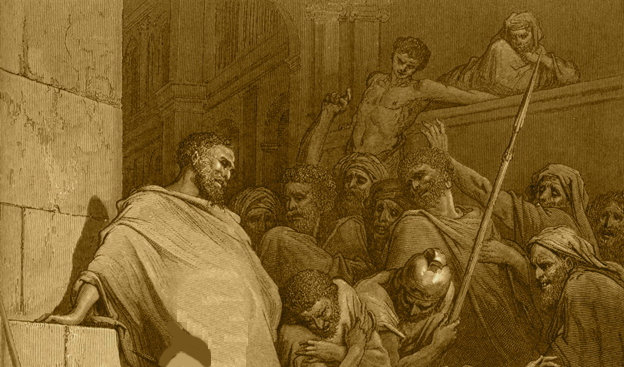“And the men that held Jesus mocked him and smote him. And when they had blindfolded him, they struck him on the face, and asked him, saying, ‘Prophesy, who is it that smote thee?’” (Luke 22:63-64).
The presence of the shepherd is essential for the safety and stability of the sheep. So it should not surprise us that once the Great Shepherd of the flock of God is smitten, his sheep scatter (Zech. 13:7). This Son of God, who cannot be contained by the heaven of heavens is now condemned by the dust of earth. He who causes the devils to tremble (James 2:19) is now trampled on by the most wicked men alive. Christ, who is both light to the Gentiles (Isa. 49:6) and the glory of his people Israel, is now made their blindfold buffoon (Luke 22:64) and the object of their reproachful game.
But what can they find to mock him for? His words were few; and when he spoke, some of these same men were amazed at the power contained in them (Luke 4:22, 32), “Never man spoke like this man,” was their own frequent acclamation. His gesture was civil and modest, his behavior humble and meek, his person, fairer than the sons of men. Everything in him challenges admiration and reverence and overtakes the heart with an awful love.
The Old Testament nation of Israel, God’s chosen people, were intended by God to be ruled by him alone. Yet they were not content with this arrangement. They complained to God, “make us a king to judge us like all the other nations,” (1 Sam. 8:5, 19-20). And in the fullness of time, God fulfilled his promise to his people by sending the King of kings (Psalm 99). Yet how soon they rush to dishonor, abuse, and eventually murder him under the very title which they themselves gave him, the “king of the Jews,” (John 19:19).
All the people were astonished at his wisdom when he first taught the Scriptures in the temple at the age of twelve (Matt. 7:28). His power made them wonder, and devils themselves trembled and confessed that he was Lord. He healed the blind, the lame, the deaf, the dumb, the sick, and the dead, as well as stilled the winds and seas; these all yielded to his word. His bounty was evidenced by so many others when he fed four thousand on one occasion and then five thousand on another from one boy’s lunch of bread and fish.
Kings are said to have long arms and broad hands for matters of power and bounty. But in doing so they cannot help but also have weary shoulders in the continual guidance of those arms and hands to the fullest possible attendance, allegiance, and love. But when envy, treason, and scorn throws yet more weight on that burden, how can it be borne by any other but God himself? Such a crown, so wreathed, so lined, not only with the most thoughtful care for his own, but with contemptuous abuse and scorn from his enemies must surely be a burden too great for humanity to support.
And yet this One who was despised and rejected of men continually stands ready to move me from my place of lack and need, “Come unto me all of you, come buy, and eat; yea, come, buy wine and milk without money and without price,” (Isa. 55:1). He is able to deliver all who call out in faith to him, for he gave himself as a ransom for the souls of men. As the Good Shepherd, he willingly laid down his life for his sheep (John 10:11).
Will you, reader, despise and reject him and further harden your heart toward him? Or will you turn from your sin to follow him when you hear his voice calling you?
Contemplations:
- How long, oh Lord, shall the ungodly triumph? How long shall wickedness abound? How long shall they despitefully speak against your people? Was it not enough, Lord, for you to leave your throne and to embrace your humanity (John 16), to become as a servant, lower than the angels (Heb. 2:9), in all things like us except in our sin (Heb. 2:17)?
- You did this all for me, Lord. You became a servant, both knowing and doing your Father’s will. It was your very meat and drink to do so (John 4:34). Let me share in your strength that I might take up your cross and follow you in all things.
- It was God’s way that you, Lord, become not only a man, but a servant of men, bearing the scorn of men (Phil. 2:7). For how could your blood satisfy our debt to God without your shame? Could you have the wounds without their scoffs? Alas no. You did this all to save me from eternal damnation and reward me with life in heaven with you.
Further References for Luke 22:63-64:
John 18:22; Matt. 26:59; Mark 14:55, 65; Heb. 12:2


